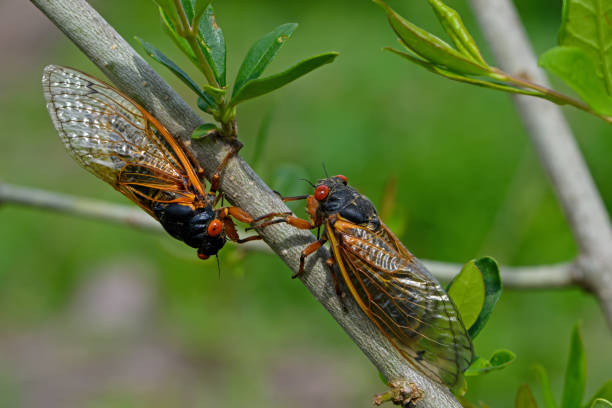Early Cicada Emergence Expected in Missouri This Week
2 min read
Emerged 17 year Brood X periodical cicadas. (IStock Photo)
MISSOURI (The Lake Tribune) — An early emergence of cicadas is predicted in Missouri this week, potentially marking one of the earliest appearances of these insects in decades. According to the Missouri Department of Conservation (MDC), this phenomenon is due to a unique convergence of environmental factors, including soil temperatures reaching the critical threshold of 64 degrees eight inches below the surface.
This early emergence, anticipated as soon as Tuesday, April 16, is driven by unusually warm soil temperatures across Missouri, as reported by the National Weather Service. Additionally, visible signs such as inch-wide holes at the base of trees and early blooming of irises, traditionally associated with cicada emergence, have been noted across the state.
The last significant event of this nature occurred in 1998 when the largest brood of 13-year cicadas emerged simultaneously with the 17-year cicadas, an event not seen since 1777. While this year’s emergence includes these two broods, they will not regionally overlap as in the past.
Entomologists express concern that an exceptionally early start may expose the cicadas to risks, such as late freezes which could result in widespread population loss. However, meteorological forecasts suggest a lower likelihood of such cold snaps in the coming weeks, providing a more favorable environment for the cicadas.
The emergence of cicadas, often dubbed a “cicadapocalypse,” is expected to be a noisy spectacle but not as overwhelming as sensational reports suggest. The overlap of the 13-year and 17-year broods is historic, yet their geographical ranges do not coincide to double their numbers in any single area.
While the sight and sound of billions of cicadas may be daunting, they offer ecological benefits such as aiding in the nourishment of local wildlife and enriching soil fertility through their decay. Homeowners are advised to delay planting new trees until the fall to avoid damage from the feeding cicadas.
Follow The Lake Tribune for More Reliable News in Your Feed




